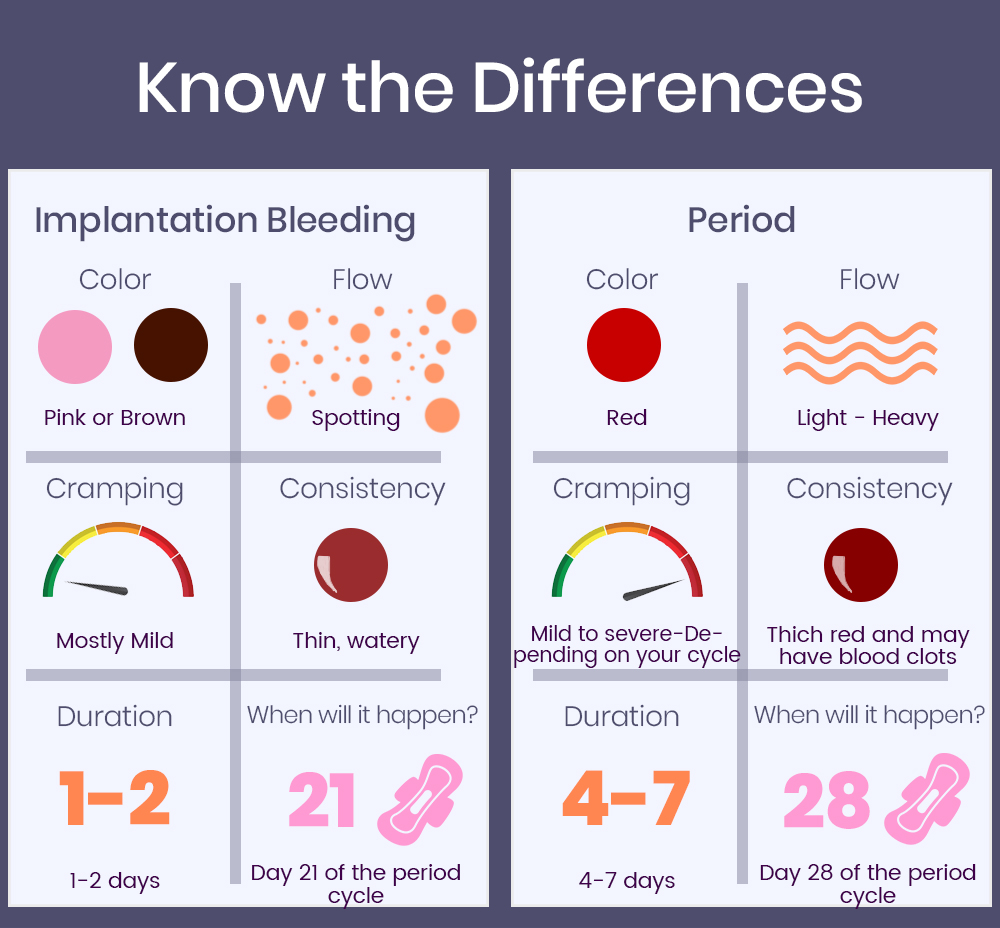
Implantation bleeding is an early sign of pregnancy and happens right before the expected period date. It is among the common reasons for bleeding during the first trimester of pregnancy. Implantation bleeding generally occurs about 1 – 2 weeks after the egg has been fertilized in the uterus. The time of implantation bleeding is around 1 week after ovulation and a few days before the female has her expected period.
Implantation bleeding is generally spotting or light bleeding, much less than a normal period flow. This bleeding may occur just once or may last for a few hours. To the maximum, implantation bleeding can last up to 3 days.
Implantation bleeding may be pink or brown in color and thus is easy to differentiate from the bright red bleeding of periods. A female usually does not need to use a pad or a tampon in case of implantation bleeding as the bleeding is very less, just like spotting.
Also Read- What does Spotting instead of the Period Indicate?
Table of Contents
Implantation Bleeding Symptoms
Implantation bleeding is one of the earliest pregnancy symptoms which can be easily identified by the female. As implantation bleeding occurs before the expected period date, many females confuse implantation bleeding with an early period or spotting. Symptoms of implantation bleeding include-
- Light bleeding or spotting which may look like pink or brown discharge
- Abdominal cramps
- Vaginal discharge (thick, clear, white, or yellow in color)
- Bloating
- Sensitive or tender breasts
- Nausea
- Headache
- Mood swings
- A decrease in basal body temperature (Implantation dip)*
(*Implantation dip– It is a minor drop in the body temperature that occurs about 7-10 days after ovulation due to an increase in the progesterone hormone.)
The above-mentioned symptoms can also be those of PMS (Premenstrual Syndrome) or ovulation. So having such symptoms does not guarantee that you are pregnant. On having such symptoms, consult a gynecologist or take a home pregnancy test to confirm pregnancy.

What causes implantation bleeding?
The sperm fertilizes the egg to form an embryo which then travels to the uterus, where the egg implants itself into the lining. This attachment of the embryo to the lining of the uterus causes implantation bleeding. Implantation bleeding is absolutely normal and not a thing to worry about.
Also Read- Why do I have Bleeding during Pregnancy? ( Trimester Wise )
Do you need treatment for implantation bleeding?
Implantation bleeding is a normal early sign of pregnancy and not usually a cause of concern. Being a normal symptom of pregnancy, there is no treatment needed for implantation bleeding.
Implantation bleeding usually goes away within a couple of days and needs no treatment. Abnormally heavy bleeding can be a sign of menstruation problems like AUB (abnormal uterine bleeding) or a pregnancy complication. The female is suggested to consult a gynecologist to rule out such risks and complications.
Other Causes of unusual spotting or light bleeding
Many other factors or medical conditions can also cause spotting or light bleeding before periods. Some of the factors might be harmless but some can be signs of a serious medical condition that need immediate treatment.
Other causes of spotting or bleeding before periods can be-
- Hormonal or physical changes
- Uterine Fibroids
- Uterine polyps
- Sexually transmitted diseases like trichomoniasis
- Cervical problems like infection or overgrowths
- Ectopic pregnancy
- Miscarriage
It is important for the female to consult a gynecologist to find out the cause of the bleeding or spotting. In case of an underlying medical condition like fibroids, polyps, STDs, etc make sure that you get proper treatment without delay as these can have serious health repercussions.

When to call your gynecologist?
Implantation bleeding is totally normal and needs no medical attention. But at times, such light bleeding or spotting can be due to other conditions like irritation of the cervix after a pelvic exam, sexual intercourse, or vaginal infections.
But sometimes, when the bleeding does not stop and gets heavier and painful, it’s a sign of abnormal pregnancy such as molar pregnancy, ectopic pregnancy, or even miscarriage. The safe thing to do in such cases is to speak to a gynecologist immediately as you experience it.
Also Read







